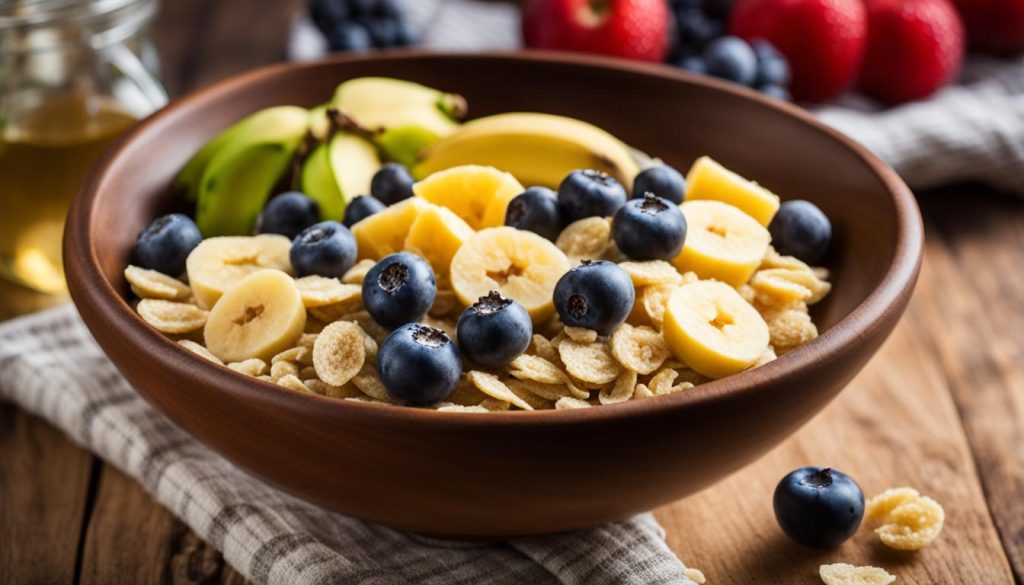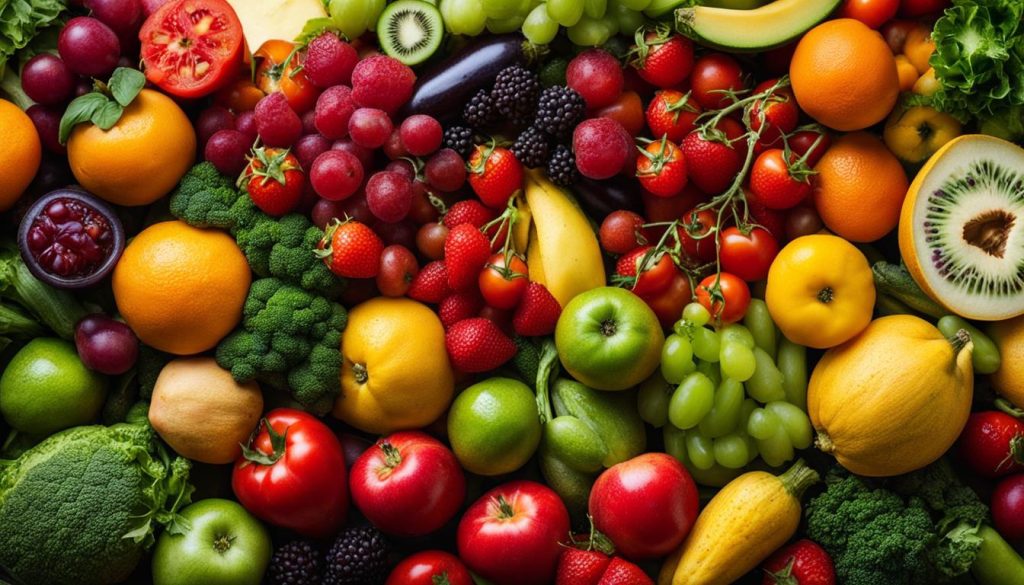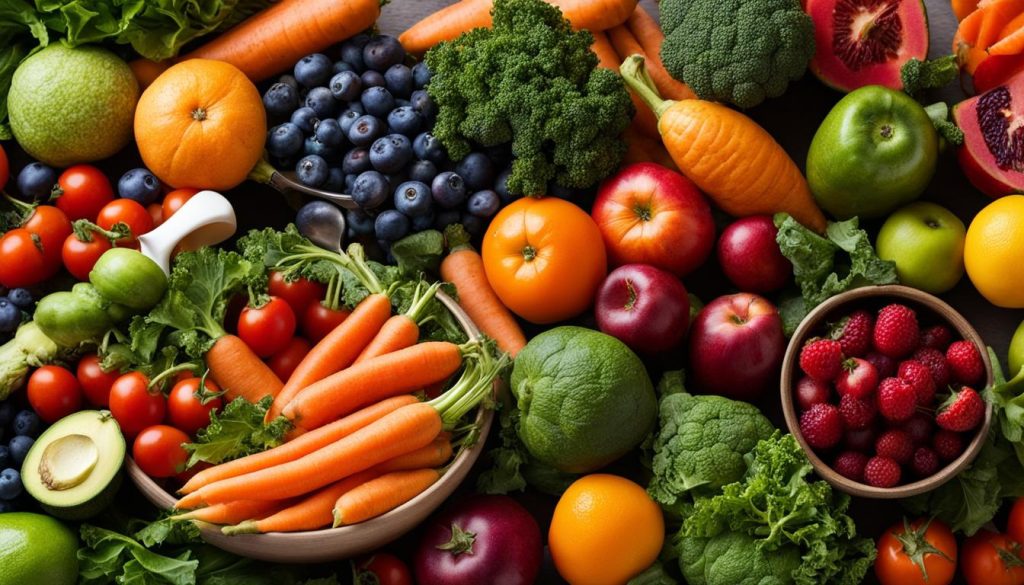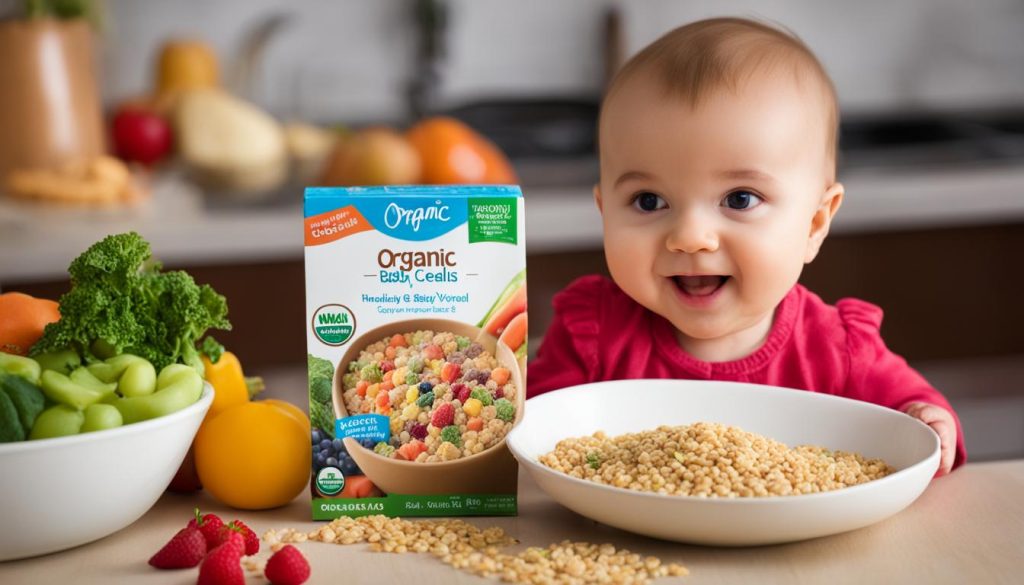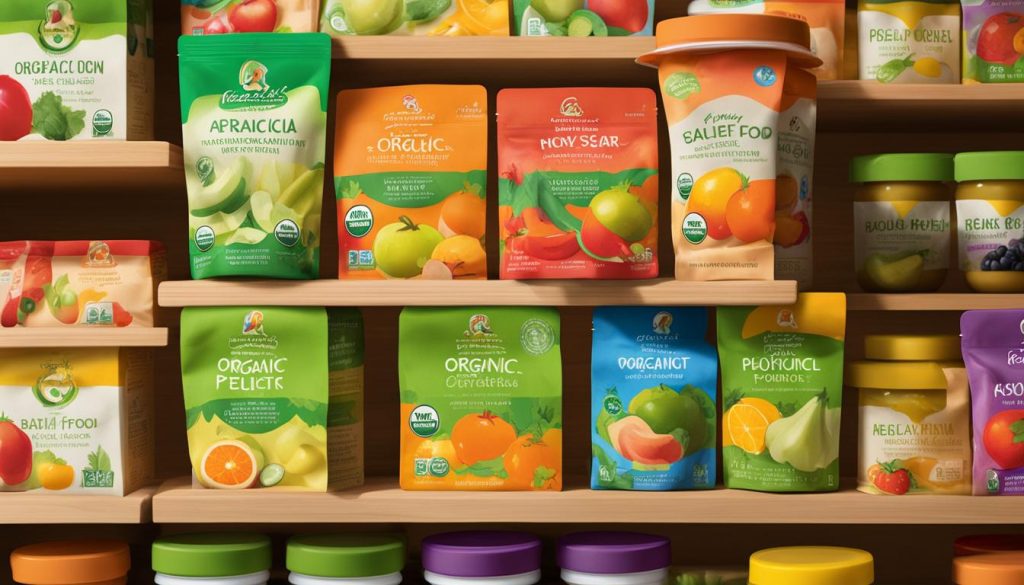Welcome to my comprehensive review on finding the best cereal for your baby! Introducing solid foods to infants is an important milestone, and choosing the right cereal can make all the difference. In this article, I will guide you through the world of baby cereals, focusing on the benefits of organic options and exploring various baby cereal brands. Let’s ensure your little one gets the best start to their solid food journey.
When it comes to giving your baby the best, organic baby cereal is a great choice. Not only does it provide essential nutrients for your little one’s growth and development, but it also reduces their exposure to harmful chemicals. In this review, we will dive into the advantages of organic baby cereal and discuss why it should be on your shopping list.
Furthermore, we will explore different baby cereal brands, comparing their features and nutritional content. From Gerber to Earth’s Best, we’ll help you navigate the market and find the perfect brand for your baby’s needs. Whether you’re looking for a single grain or multigrain variety, we have you covered.
Join me on this journey as we uncover the best cereal options for your baby. Together, we’ll ensure your little one gets the nourishment they need while introducing them to the wonderful world of solid foods.
What is Baby Cereal and When to Start?
Baby cereal is a popular choice for a baby’s first solid food. It is typically made from finely ground grains such as oats, rice, barley, or quinoa. The consistency of baby cereal is smooth and puree-like, making it easy for babies to eat and digest. It serves as a bridge between a liquid diet and solid foods, helping babies adjust to the texture of solids.
But when should you start introducing baby cereal to your little one? The general recommendation is to introduce solids around 4 to 6 months of age. However, it’s important to look for signs of readiness in your baby. These signs include sitting up with good head control and showing interest in food by watching you eat or reaching for your food.
It’s vital to remember that every baby is different, and their readiness for solids may vary. It’s always best to consult with your pediatrician before introducing any new foods to your baby’s diet. They can provide personalized guidance based on your baby’s development and needs.
| Signs of Readiness for Solid Foods: | Not Ready for Solid Foods: |
|---|---|
| Sitting up with good head control | Inability to sit up unsupported |
| Showing interest in food by watching others eat | Lack of interest in food |
| Reaching for food during mealtime | Lack of coordination to bring food to mouth |
Every baby is different, so it’s important to look for signs of readiness before starting solids. It’s also crucial to introduce new foods one at a time and watch for any signs of allergies or intolerances. Your baby’s healthcare provider is the best resource for personalized advice.
The Benefits of Organic Baby Cereal
When it comes to feeding your baby, providing the best nutrition is always a top priority. Organic baby cereal offers several benefits that make it a great choice for your little one. Unlike conventional baby food, organic baby cereal is made from grains that are grown without the use of synthetic pesticides or fertilizers. This means that your baby is exposed to fewer harmful chemicals, reducing their risk of potential health issues.
Not only is organic baby cereal free from pesticides, but it also tends to have a higher nutritional content compared to conventional options. Many organic baby cereals are fortified with essential vitamins and minerals to support your baby’s growth and development. These added nutrients can be especially beneficial for babies who are just starting to eat solid foods and may not be getting all the nutrients they need from breast milk or formula alone.
Another advantage of organic baby cereal is that it can be gluten-free. This makes it a suitable option for babies with gluten sensitivities or allergies. Gluten-free baby cereals are typically made from alternative grains like quinoa or millet, which are naturally gluten-free and still provide the necessary nutrients for your baby’s development.
“Organic baby cereal is a safe and nutritious choice for your little one. By choosing organic, you can provide them with the best start in life and reduce their exposure to harmful chemicals.”
Overall, the benefits of organic baby cereal make it a popular choice among parents who prioritize the health and well-being of their babies. By choosing organic, you can ensure that your little one is getting the best quality nutrition and minimizing their exposure to potentially harmful substances.
The Nutritional Content of Organic Baby Cereal
One of the key advantages of organic baby cereal is its higher nutritional content compared to conventional options. Organic baby cereal brands often include additional vitamins and minerals to support your baby’s growth and development. Some common nutrients found in organic baby cereals include:
- Iron: Iron is essential for your baby’s brain development and overall growth. Many organic baby cereals are fortified with iron to ensure that your little one is getting enough of this important nutrient.
- Calcium: Calcium is important for the development of strong bones and teeth. Organic baby cereals often contain calcium to help support your baby’s growing skeletal system.
- Vitamin D: Vitamin D is crucial for the absorption of calcium and promotes healthy bone development. Organic baby cereals may be fortified with vitamin D to ensure that your baby is getting enough of this essential nutrient.
- Zinc: Zinc plays a key role in supporting your baby’s immune system and promoting healthy cell growth. Organic baby cereals may contain zinc to support your baby’s overall health and well-being.
With its higher nutritional content, organic baby cereal provides a nutrient-dense option for your little one’s first solid foods. It gives you peace of mind knowing that you are offering them a wholesome and nourishing meal.
| Nutrient | Conventional Baby Cereal | Organic Baby Cereal |
|---|---|---|
| Iron (mg) | 2 | 4 |
| Calcium (mg) | 20 | 30 |
| Vitamin D (IU) | 10 | 15 |
| Zinc (mg) | 1 | 2 |
Table: Nutritional comparison between conventional and organic baby cereals. The values represent the average nutrient content per serving.
As shown in the table above, organic baby cereal tends to have higher levels of important nutrients like iron, calcium, vitamin D, and zinc compared to conventional baby cereal. These nutrients are essential for your baby’s growth and development, making organic baby cereal a great choice for their first solid foods.
Choosing the Right Baby Cereal Brand
When it comes to selecting the best cereal for your baby, there are several notable brands to consider. Each brand offers different options to cater to your baby’s specific needs. Here are three top baby cereal brands that have gained popularity among parents:
Gerber Organic Single Grain Oatmeal Baby Cereal
Gerber is a well-known brand in the baby food industry, and their organic single grain oatmeal baby cereal is a popular choice among parents. It is made with organic whole grains and fortified with iron, providing essential nutrients for your baby’s growth and development. This cereal has a smooth texture that is easy for babies to eat and digest.
Earth’s Best Organic Whole Grain Baby Oatmeal Cereal
Earth’s Best is another trusted brand that offers a variety of organic baby food products. Their organic whole grain baby oatmeal cereal is made with non-GMO ingredients and does not contain any artificial flavors or colors. It is fortified with iron and provides a good source of essential vitamins and minerals for your baby.
Beech-Nut Stage 1 Organic Oatmeal Cereal
Beech-Nut is known for producing high-quality baby food products, and their Stage 1 organic oatmeal cereal is no exception. This cereal is made with whole grain oats and is USDA certified organic. It is gentle on your baby’s stomach and easy to digest. Beech-Nut cereal is also fortified with iron and contains no artificial preservatives.
| Brand | Key Features |
|---|---|
| Gerber Organic Single Grain Oatmeal Baby Cereal | Organic, fortified with iron, smooth texture |
| Earth’s Best Organic Whole Grain Baby Oatmeal Cereal | Organic, non-GMO, fortified with iron, no artificial flavors or colors |
| Beech-Nut Stage 1 Organic Oatmeal Cereal | Organic, gentle on stomach, fortified with iron, no artificial preservatives |
When choosing a baby cereal brand, it’s important to consider factors such as organic options, nutritional content, and any specific dietary needs your baby may have. These top baby cereal brands offer a variety of choices to meet your baby’s unique requirements, ensuring they receive the necessary nutrients for their growth and development.
Key Considerations for Baby Cereal Safety
When it comes to feeding our little ones, safety is always a top priority. Baby cereal is a popular choice for introducing solid foods, but it’s important to be aware of potential dangers and take necessary precautions. Here are some key considerations for ensuring the safety of baby cereal:
1. Arsenic in Baby Cereal
Arsenic is a naturally occurring heavy metal that can be found in varying levels in rice and rice-based products, including baby cereal. High levels of arsenic can be harmful to babies, as their developing bodies are more sensitive to the effects of toxins. To minimize exposure, it is recommended to include a variety of grains in your baby’s diet, such as oats, barley, and quinoa. This helps reduce reliance on rice-based products and lowers the risk of excessive arsenic intake.
2. Choosing Safe Cereal Brands
Not all baby cereal brands are created equal in terms of safety and quality. When selecting a baby cereal brand, it’s important to look for options that have undergone rigorous testing for contaminants, including arsenic. Choose brands that have transparent labeling practices and conduct regular testing to ensure the safety of their products. Reading reviews and seeking recommendations from trusted sources can also help you make an informed decision.
3. Introducing New Foods Gradually
Introducing new foods to your baby’s diet should be done gradually to monitor for any allergic reactions or intolerance. Start with a single grain baby cereal and introduce new ingredients one at a time, waiting three to five days before introducing the next one. This helps identify any potential allergens and makes it easier to pinpoint the cause of any adverse reactions. Always consult with your pediatrician if you have any concerns or questions about introducing new foods.
| Key Safety Considerations for Baby Cereal | Actions to Ensure Safety |
|---|---|
| Arsenic in Baby Cereal | Include a variety of grains in your baby’s diet to reduce reliance on rice-based products. |
| Choosing Safe Cereal Brands | Select brands that have undergone rigorous testing for contaminants and have transparent labeling practices. |
| Introducing New Foods Gradually | Start with a single grain baby cereal and introduce new ingredients one at a time, waiting three to five days between each new addition. |
By being mindful of these key considerations, you can ensure the safety of baby cereal and provide your little one with a healthy and nutritious start to their solid food journey.
Tips for Feeding Baby Cereal
Introducing baby cereal to your little one can be an exciting milestone in their journey of exploring solid foods. To ensure a smooth and enjoyable feeding experience, here are some useful tips:
1. Start with a Single Grain, Iron-Fortified Variety
When beginning your baby’s cereal journey, opt for a single grain cereal that is fortified with iron. This will provide essential nutrients for your baby’s growth and development. Good options include rice cereal or oatmeal cereal. Mix the cereal with breast milk or formula to create a smooth consistency that is easy for your baby to swallow.
2. Introduce New Foods Gradually
As you expand your baby’s diet, introduce new foods gradually. Wait three to five days before introducing a new ingredient. This will allow you to monitor your baby for any allergic reactions or digestive issues. If your baby shows signs of discomfort or allergies, consult your pediatrician for guidance.
3. Pay Attention to Your Baby’s Cues
Your baby will give you cues to let you know if they are hungry or full. Watch for signs of hunger such as opening their mouth, leaning toward the spoon, or making sucking motions. Similarly, if your baby turns away, clamps their mouth shut, or spits out the food, it may be a sign that they are full or not ready for more.
Remember that each baby is unique, and their readiness for solids may vary. It’s important to follow your baby’s lead and not force them to eat if they are not interested. Consult with your pediatrician for personalized advice and to address any concerns you may have.
By following these tips and being attentive to your baby’s needs, you can make the feeding experience enjoyable and promote healthy eating habits as your little one grows.
Exploring Other Baby Cereal Options
When it comes to feeding your little one, there are more options for baby cereal beyond the traditional rice and oatmeal varieties. In this section, we’ll explore alternative choices that cater to specific needs and dietary restrictions. Whether your baby has gluten sensitivities or you’re looking for fortified options, there’s a baby cereal out there that fits your requirements.
Gluten-Free Baby Cereal
If your baby has gluten sensitivities or allergies, there are gluten-free baby cereals available in the market. These cereals are made with alternative grains like quinoa or millet that do not contain gluten. They provide a safe and nutritious option for babies who need to avoid gluten. When choosing gluten-free baby cereals, it’s important to check the packaging for any potential cross-contamination or allergens.
Fortified Baby Cereal
For parents who want to provide their little ones with additional nutrients, fortified baby cereals are a good choice. These cereals are enriched with vitamins, minerals, and other essential nutrients, such as omega-3 fatty acids and probiotics. Fortified baby cereals can help ensure that your baby is getting all the necessary nutrients for their growth and development. It’s important to read the labels and choose cereals that offer the specific nutrients you’re looking for.
| Brand | Cereal Type | Key Features |
|---|---|---|
| Happy Baby Organics | Multigrain Quinoa Baby Cereal | Gluten-free, organic, fortified with iron and choline |
| Bio-Kinetics | Organic Brown Rice Cereal | Gluten-free, organic, no added sugar or salt |
| Plum Organics | Mighty 4 Baby Cereal | Contains superfoods like quinoa, chia, and kale |
Providing your baby with a variety of cereal options can help introduce them to different flavors and textures, while also ensuring they receive the necessary nutrients for their development.
Remember, every baby is unique, and their dietary needs may vary. It’s essential to consult with your pediatrician before introducing any new foods to your baby’s diet, including baby cereals. They can provide personalized guidance based on your baby’s individual needs and health.
Conclusion
After exploring the benefits of organic baby cereal and discussing different baby cereal brands, it is clear that choosing the best cereal for your baby is a significant decision. It is essential to consider factors such as organic options, nutritional content, and allergen considerations.
When it comes to iron-rich baby cereal, top brands like Gerber and Earth’s Best offer a range of choices to meet your baby’s needs. These brands provide multigrain options that can further enhance your baby’s nutrition. By opting for these varieties, you can ensure that your little one receives the necessary nutrients for their growth and development.
However, it is crucial to prioritize safety by introducing new foods slowly and monitoring for any signs of allergies or intolerance. Always consult with your pediatrician if you have any concerns or questions regarding your baby’s diet.
By following these guidelines and selecting the best multigrain baby cereal, you can set your baby on the right path to a healthy and nutritious start in life.
FAQ
Is baby cereal important for introducing solids to infants?
Yes, baby cereal helps babies transition from a liquid diet and provides essential nutrients for their growth and development.
What is baby cereal made of?
Baby cereal is typically made of finely ground grains like oats, rice, barley, or quinoa.
When can babies start eating cereal?
Babies can start eating cereal around 4 to 6 months of age, when they show signs of readiness such as sitting up with good head control and showing interest in food.
What are the benefits of organic baby cereal?
Organic baby cereal is made from grains grown without synthetic pesticides, reducing your baby’s exposure to harmful chemicals. It also tends to have higher nutritional content and can be gluten-free.
What are some recommended baby cereal brands?
Some recommended baby cereal brands include Gerber Organic Single Grain Oatmeal Baby Cereal, Earth’s Best Organic Whole Grain Baby Oatmeal Cereal, and Beech-Nut Stage 1 Organic Oatmeal Cereal.
Are there any safety considerations for baby cereal?
Baby rice cereal, in particular, has been found to contain arsenic, so it’s important to offer a variety of grains to reduce exposure. Introduce new foods slowly and watch for signs of allergic reactions or intolerance.
How should I feed my baby cereal?
Start with a single grain, iron-fortified variety mixed with breast milk or formula. Introduce new foods gradually, waiting three to five days before adding a new ingredient. Pay attention to your baby’s cues and consult with your pediatrician if needed.
Are there alternatives to rice and oatmeal cereal?
Yes, gluten-free baby cereals made from alternative grains like quinoa or millet are available for babies with gluten sensitivities. Fortified baby cereals with additional nutrients are also an option.
How do I choose the best cereal for my baby?
Consider factors like organic options, nutritional content, and allergen considerations. Choose a reputable brand that is fortified with iron and contains minimal ingredients.

